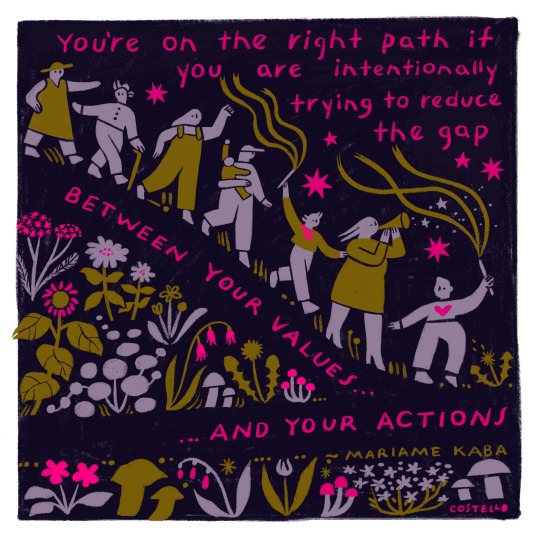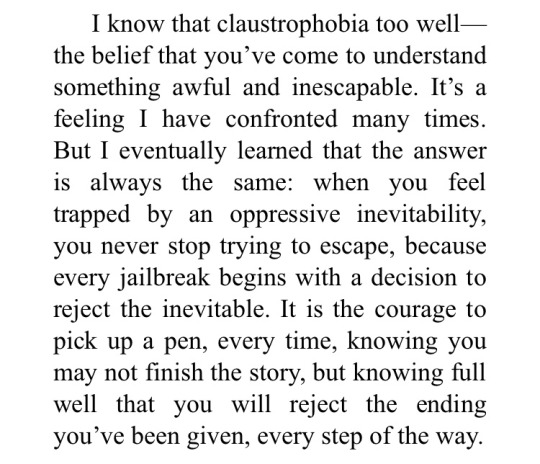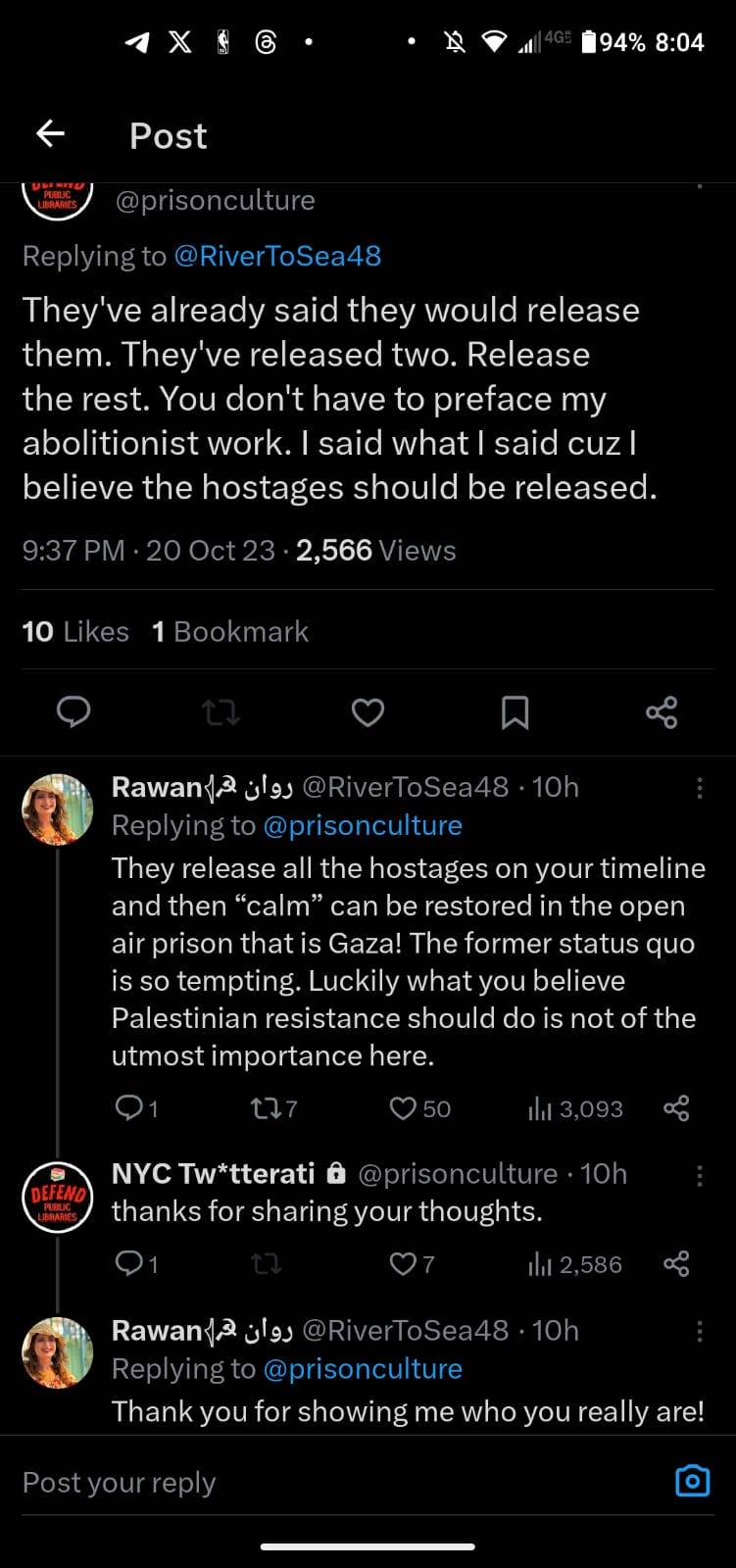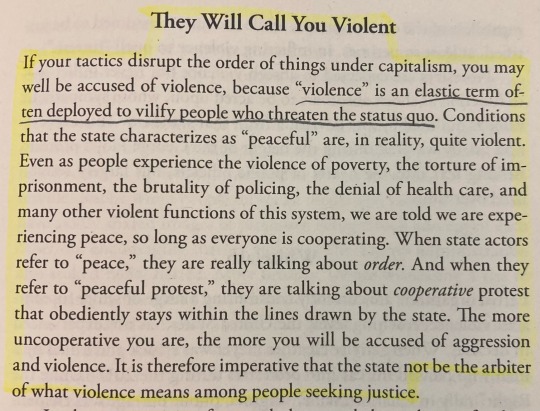#mariame kaba
Text
just a friendly reminder that, just because slavery was formally "abolished" in the so-called united states* in 1865, enslavement itself is still ongoing in the form of incarceration, which disproportionately affects Black and Indigenous people

(*i say "so-called" because the US is a settler-colonial construction founded on greed, extraction, and white supremacy)
recommended readings/resources:
The New Jim Crow: Mass Incarceration in the Age of Colorblindness by Michelle Alexander
"How the 13th Amendment Kept Slavery Alive: Perspectives From the Prison Where Slavery Never Ended" by Daniele Selby
"So You're Thinking About Becoming an Abolitionist" by Mariame Kaba
"The Case for Prison Abolition: Ruth Wilson Gilmore on COVID-19, Racial Capitalism & Decarceration" from Democracy Now! [VIDEO]
#i know most of u probably followed me for fandom stuff but abolition and decolonization and sex workers' rights are so close to my heart#normally i'd post this on my academia blog but i have more followers here so. here ya go#enslavement is still ongoing in SO many other ways and it disproportionately targets BIPOC and disabled and impoverished people#might make another post about that#prison abolition#abolition#racial justice#juneteenth#social justice#human rights#resources#police abolition#decolonization#michelle alexander#mariame kaba#ruth wilson gilmore#13th amendment#antiracism
9K notes
·
View notes
Text
Hope is a discipline.
It’s work to be hopeful. It’s not like a fuzzy feeling. Like, you have to actually put in energy, time, and you have to be clear-eyed, and you have to hold fast to having a vision. It’s a hard thing to maintain. But it matters to have it, to believe that it’s possible, to change the world. You know, that we don’t live in a predetermined, predestined world where like nothing we do has an impact. No, no, that’s not true! Change is, in fact, constant, right? Octavia Butler teaches us. We’re constantly changing. We’re constantly transforming. It doesn’t mean that it’s necessarily good or bad. It just is. That’s always the case. And so, because that's true, we have an opportunity at every moment to push in a direction that we think is actually a direction toward more justice.
—(Criminal justice activist) Mariame Kaba
877 notes
·
View notes
Text

Mariame Kabe // Art by Olly Costello (2023)
498 notes
·
View notes
Text

-- Mariame Kaba and Kelly Hayes, from Let This Radicalize You
803 notes
·
View notes
Text

Let This Radicalize You by Kelly Hayes & Mariam Kaba (2023)
63 notes
·
View notes
Text


By the way prisonculture is Mariame Kaba.
89 notes
·
View notes
Text

'hope is a discipline' - mariame kaba on dismantling the carceral state
#periodically reminded that things are much greater than myself#hard not to feel defeated?#nonetheless - hope is a discipline#i have to hope for better for myself#for better for the community at large#and actively resist despair#loving dora hours#we have a world to win mf.#mariame kaba#hope is a discipline
119 notes
·
View notes
Text

(Let This Radicalize You, p. 108, 111)

#philosophy#social justice#political philosophy#abolition#sociology#nonviolence#activism#mariame kaba
213 notes
·
View notes
Text
Let this radicalize you rather than lead you to despair.
Mariame Kaba
39 notes
·
View notes
Text

more in Mariame Kaba's We Do This Til We Free Us.
76 notes
·
View notes
Text

Highly recommend the book quoted in these tweets ("Let This Radicalize You" by Mariame Kaba and Kelly Hayes)
The sections quoted above:


And one of my favorite sections:


19 notes
·
View notes
Text
Hope as a Discipline: from an interview with Mariame Kaba on the Beyond Prisons podcast
(transcript and audio here)
Kim: I think someone retweeted something you posted the other day and the last few days, it just really resonated with me and just has helped me tremendously. There are a lot of times where I’m kind of lurking on Twitter, not necessarily engaging for a lot of reasons, but I saw this… it is something you wrote about hope being a discipline. I got to tell you, it made my day, if not my week, absolutely! Because it’s something that... it is easy to get down on everything that’s going on.
Mariame: Sure.
Kim: It’s really easy to kind of look around and be like, “Oh my God, everything… set it all on fire and let’s just be done!” [laughs] Especially right now and I think that plugging in with folks and reading things and listening to things that are affirming and uplifting and do allow you to focus on the hopeful side of things are part of abolition. I’d like you to say something about that, but I have another part to that question because they are both related or at least, in my thinking, which is about self-care for those of us doing this work. And that’s something I spend a lot of time thinking about and talking about as well with the folks that I’m connected with.
Mariame: I always tell people, for me, hope doesn’t preclude feeling sadness or frustration or anger or any other emotion that makes total sense. Hope isn’t an emotion, you know? Hope is not optimism.
I think that for me, understanding that is really helpful in my practice around organizing, which is that, I believe that there’s always a potential for transformation and for change. And that is in any direction, good or bad. The idea of hope being a discipline is something I heard from a nun many years ago who was talking about it in conjunction with making sure we were of the world and in the world. Living in the afterlife already in the present was kind of a form of escape, but that actually it was really, really important for us to live in the world and be of the world. The hope that she was talking about was this grounded hope that was practiced every day, that people actually practiced it all the time.
And so, I bowed down to that. I heard that many years ago and then I felt the sense of, Oh my god. That speaks to me as a philosophy of living, that hope is a discipline and that we have to practice it every single day. Because in the world which we live in, it’s easy to feel a sense of hopelessness, that everything is all bad all the time, that there is nothing going to change ever, that people are evil and bad at the bottom. It feels sometimes that it’s being proven in various, different ways, so I get that, so I really get that. I understand why people feel that way. I just choose differently. I choose to think a different way and I choose to act in a different way. I choose to trust people until they prove themselves untrustworthy.
Jim Wallace, who people know as a liberal Evangelical, who thinks about faith a lot and talks about faith a lot and he always talks about the fact that hope is really believing in spite of the evidence and watching the evidence change. And that, to me, makes total sense. I believe ultimately that we’re going to win, because I believe there are more people who want justice, real justice, than there are those who are working against that.
And I don’t also take a short-time view, I take a long view, understanding full well that I’m just a tiny, little part of a story that already has a huge antecedent and has something that is going to come after that, that I’m definitely not going to be even close to around for seeing the end of. So, that also puts me in the right frame of mind, that my little friggin’ thing I’m doing, is actually pretty insignificant in world history, but [if] it’s significant to one or two people, I feel good about that.
If I’m making my stand in the world and that benefits my particular community of people, the people I designate as my community, and I see them benefiting by my labor, I feel good about that. That actually is enough for me.
So, maybe I just have a different perspective and I talk to a lot of young organizers - people reach out to me a lot because I’ve been organizing for a long time - I’m always telling them, “Your timeline is not the timeline on which movements occur. Your timeline is incidental. Your timeline is only for yourself to mark your growth and your living.” But that’s a fraction of the living that’s going to be done by the universe and that has already been done by the universe. So, when you understand that you’re really insignificant in the grand scheme of things, you just are, then it’s a freedom, in my opinion, to actually be able to do the work that’s necessary as you see it and to contribute in the ways that you can see fit. So, I think that’s my answer to that.
And self-care is really tricky for me, because I don’t believe in the self in the way that people determine it here in this capitalist society that we live in. I don’t believe in self-care, I believe in collective care, collectivizing our care, and thinking more about how we can help each other. How can we collectivize the care of children so that more people can feel like they can actually have their kids but also live in the world and contribute and participate in various different kinds of ways? How do we do that?
How do we collectivize care so that when we’re sick and we’re not feeling ourselves, we’ve got a crew of people that are not just our prayer warriors, but our action warriors who are thinking through with us? Like, I’m not just going to be able to cook this week, and you have a whole bunch of folks there, who are just putting a list together for you and bringing the food every day that week and you’re doing the same for your community, too.
I want that as the focus of how I do things and that really comes from the fact that I grew up the daughter of returned migrants, African-returned migrants. I don’t see the world the way that people do here, I just don’t. I don’t agree with it, I think capitalism is actually continuously alienating us from each other, but also even from ourselves and I just don’t subscribe. And for me, it’s too much with, “Yeah I’m going to go do yoga and then, I’m going to go and do some sit-ups and maybe I’ll like, you know, go to…” You don’t have to go anywhere to care for yourself.
Brian: [chuckles] Right.
Mariame: You can just care for yourself and your community in tandem and that can actually be much more healthy for you, by the way. Because all this internalized, internal reflection is not good for people. You have to be able to have... Yes, think about yourself, reflect on your practice, okay, but then you need to test it in the world, you’ve got to be with people. So, that’s important. And I hate people! So, I say that as somebody who actually is really anti-social...
[Brian and Kim laugh]
Mariame: … and I say, “I hate people.” I don’t want to socialize in that kind of way but I do want to be social with other folks as it relates to collectivizing care.
Kim: It’s something I say quite often, so…
Brian: Yeah, I deeply identify with that.
Kim: …the way you say it, like “Oh my gosh, I hate people,“ but yeah, I totally hear you, I mean I get it, I get it. Brian?
Brian: Yeah, I loved that so much. Thank you for that response right there.
#mariame kaba#beyond prisons#abolition#i think she's right!!#and i am tryin to do this#i think for me next thing is shifting more of my energy into collective care
7 notes
·
View notes
Text
"Organizing is not a process of ideological matchmaking. Most people’s politics will not mirror our own, and even people who identify with us strongly on some points will often differ sharply on others. When organizers do not fully understand each other’s beliefs or identities, people will often stumble and offend one another, even if they earnestly wish to build from a place of solidarity. Efforts to build diverse, intergenerational movements will always generate conflict and discomfort. But the desire to shrink groups down to spaces of easy agreement is not conducive to movement building.
The forces that oppress us may compete and make war with one another, but when it comes to maintaining the order of capitalism and the hierarchy of white supremacy, they collaborate and work together based on their death-making and eliminationist shared interests. Oppressed people, on the other hand, often demand ideological alignment or even affinity when seeking to interrupt or upend structural violence. This tendency lends an advantage to the powerful that is not easily overcome.
Put simply, we need more people. What do we mean by this? We are not talking about launching search parties to find an undiscovered army of people with already-perfected politics with whom we will easily and naturally align. Instead, organizing on the scale that our struggles demand means finding common ground with a broad spectrum of people, many of whom we would never otherwise interact with, and building a shared practice of politics in the pursuit of more just outcomes. It’s a process that can bring us into the company of people who share our beliefs quite explicitly, but to create movements, rather than clubhouses, we need to engage with people with whom we do not fully identify and may even dislike. We can build upon our expectations of such people and negotiate protocols around matters of respect, but the truth is, we will sometimes be uncomfortable or even offended. We will, at times, have to constructively critique people’s behavior or simply allow them room to grow. There will be other times, of course, when we have to draw hard lines, but if we cannot organize beyond the bounds of our comfort zones, we will never build movements large enough to combat the forces that would destroy us."
-- Kelly Hayes and Mariame Kaba, from "How Much Discomfort Is the Whole World Worth?"
116 notes
·
View notes
Text
#france daigle#christina sharpe#terry tempest williams#alicia garza#sakine cansız#mariame kaba#susan sontag#lisa wells#lorraine o’grady#paul valéry#alexis pauline gumbs#carolyn forché#ann snitow#nicholas ridout#leanne betasamosake simpson#mckenzie wark#lynne tillman#fernando pessoa#quotes#quotations
3 notes
·
View notes
Text
I know for a fact that we can’t heal or hurt alone. We must heal or hurt in relationship with other people.
— mariame kaba
3 notes
·
View notes
